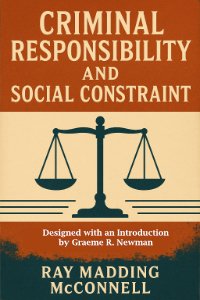By Ray Madding Mcconnell
Ray Madding McConnell’s Criminal Responsibility and Social Constraint first appeared in 1912 as one of the more philosophically ambitious works of the American Progressive Era. Though rarely cited today, the book occupies a fascinating place in the early twentieth-century dialogue between philosophy, criminology, and legal reform. Its author, who died shortly before the book’s publication, taught social ethics at Harvard and belonged to a generation deeply convinced that clearer thought could repair the accumulating confusions of modern criminal law. His book is therefore both a legacy and an argument: a legacy of Progressive rationalism and an argument for reconsidering the foundations of punishment in an age increasingly aware of causation, psychology, and social science.
More than a century after its publication, Criminal Responsibility and Social Constraint offers a valuable perspective for scholars, legal theorists, and reformers. It is a window into the moment when American thought on crime and punishment began to absorb scientific psychology, social statistics, and philosophical determinism. It presents an early, coherent version of a consequentialist theory of punishment that still structures major parts of modern practice. And it invites readers to confront the perennial tension between causation and accountability: how can a society committed to science and determinism still punish, censure, and regulate?
McConnell’s answer is that responsibility is a socially constructed tool—one that must be justified by its utility rather than by metaphysical claims about freedom. Whether one accepts or contests that answer, it remains a stimulus to deeper thinking about the moral and practical foundations of the criminal law. In that sense, McConnell’s book continues to speak forcefully to our age, reminding us that the architecture of justice must rest on reasons we can defend, not merely on traditions we have inherited.
Read-Me.Org Inc. New York-Philadelphia-Australia. 2025. p.234.



